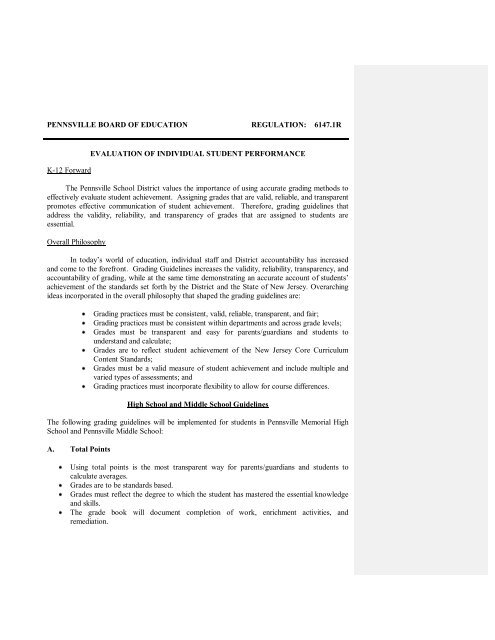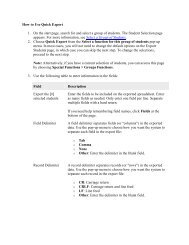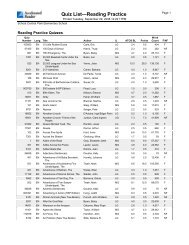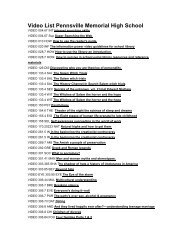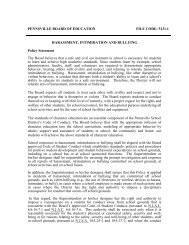PSD BOE Grading Policy 2010 (pdf) - Pennsville School District
PSD BOE Grading Policy 2010 (pdf) - Pennsville School District
PSD BOE Grading Policy 2010 (pdf) - Pennsville School District
Create successful ePaper yourself
Turn your PDF publications into a flip-book with our unique Google optimized e-Paper software.
PENNSVILLE BOARD OF EDUCATION REGULATION: 6147.1R<br />
K-12 Forward<br />
EVALUATION OF INDIVIDUAL STUDENT PERFORMANCE<br />
The <strong>Pennsville</strong> <strong>School</strong> <strong>District</strong> values the importance of using accurate grading methods to<br />
effectively evaluate student achievement. Assigning grades that are valid, reliable, and transparent<br />
promotes effective communication of student achievement. Therefore, grading guidelines that<br />
address the validity, reliability, and transparency of grades that are assigned to students are<br />
essential.<br />
Overall Philosophy<br />
In today‟s world of education, individual staff and <strong>District</strong> accountability has increased<br />
and come to the forefront. <strong>Grading</strong> Guidelines increases the validity, reliability, transparency, and<br />
accountability of grading, while at the same time demonstrating an accurate account of students‟<br />
achievement of the standards set forth by the <strong>District</strong> and the State of New Jersey. Overarching<br />
ideas incorporated in the overall philosophy that shaped the grading guidelines are:<br />
<strong>Grading</strong> practices must be consistent, valid, reliable, transparent, and fair;<br />
<strong>Grading</strong> practices must be consistent within departments and across grade levels;<br />
Grades must be transparent and easy for parents/guardians and students to<br />
understand and calculate;<br />
Grades are to reflect student achievement of the New Jersey Core Curriculum<br />
Content Standards;<br />
Grades must be a valid measure of student achievement and include multiple and<br />
varied types of assessments; and<br />
<strong>Grading</strong> practices must incorporate flexibility to allow for course differences.<br />
High <strong>School</strong> and Middle <strong>School</strong> Guidelines<br />
The following grading guidelines will be implemented for students in <strong>Pennsville</strong> Memorial High<br />
<strong>School</strong> and <strong>Pennsville</strong> Middle <strong>School</strong>:<br />
A. Total Points<br />
Using total points is the most transparent way for parents/guardians and students to<br />
calculate averages.<br />
Grades are to be standards based.<br />
Grades must reflect the degree to which the student has mastered the essential knowledge<br />
and skills.<br />
The grade book will document completion of work, enrichment activities, and<br />
remediation.
EVALUATION OF INDIVIDUAL REGULATION: 6147.1R<br />
STUDENT PERFORMANCE<br />
B. Homework<br />
C. Extra Credit<br />
Homework is to be no more than 10% percent of a grade.<br />
Homework is not to be accepted late unless provided for in a student‟s Individualized<br />
Education Plan (“IEP”), Section 504 Accommodation Plan and/or other similarly<br />
developed academic plan.<br />
If a teacher chooses to offer extra credit, it must be standards based and offered to all<br />
students in that course.<br />
Extra credit can be no more than 5% per assignment.<br />
Extra credit can not be applied to a student‟s final grade, except in the case of the three<br />
(3) extra points applied to Honors or AP final grade.<br />
Extra credit must be used by the teacher judiciously.<br />
D<br />
Absences<br />
Students who are absent, whether excused or unexcused, will be permitted to make up<br />
missed work and assessments.<br />
Students will have at least as many school days as the student was absent to make up<br />
work.<br />
E<br />
Zeroes, Cheating, Incompletes, No Grades, and Plagiarism<br />
If a student is absent on the day that a test and/or quiz is administered or that an<br />
assignment for grade is collected, the grade for the test, quiz and/or assignment for grade<br />
is to be checked as “M” for missing and a zero placed in the gradebook until the test<br />
and/or quiz is taken, or the assignment for grade is completed.<br />
Students who have cheated on any assessment will be given a “0” with the opportunity for<br />
an alternate re-assessment during an administrative detention. If the student chooses to<br />
take the alternate re-assessment, the two scores will be averaged. If the student decides<br />
not to take the alternate re-assessment, the zero will remain.<br />
“EX” is to be used for excused assignments and it will not be used in the average.<br />
Marking period, Mid-term, and/or Final exam grades that are incomplete will be placed in<br />
the gradebook as a “0” with an “I” for incomplete checked. The “0” will be averaged into<br />
the semester or year average as a zero until the work is completed or until the deadline<br />
established for finalizing grades.<br />
Marking period, Mid-Term, and/or Final exam grades that are not graded will be placed in<br />
the gradebook as “NG” and are to be given only by Administrative directive from the<br />
Building Administrator, Superintendent or his/her designee.<br />
2
EVALUATION OF INDIVIDUAL REGULATION: 6147.1R<br />
STUDENT PERFORMANCE<br />
Plagiarism is defined as work that is copied from another source and presented as one‟s<br />
own, ranging from an idea to an entire paper. Plagiarism can be avoided through careful<br />
attention to proper citation and with the assistance of an online plagiarism prevention and<br />
originality checking service such as Turnitin.com.<br />
A student paper will be deemed to be plagiarized when the final submitted copy contains<br />
approximately 15-20% unoriginal work. This figure is a guideline for teachers, who will<br />
make the final determination. A smaller percentage of unoriginal writing will be considered<br />
faulty citation, and the paper will be graded accordingly.<br />
Composition assignments found to contain plagiarized work will be given a zero. The<br />
student will then have one day in which to write and submit a new assignment. The two<br />
grades will then be averaged.<br />
For a research paper assignment found to contain plagiarized work, the paper will be given<br />
a zero, and the student will be allowed one week to complete all the steps necessary for a<br />
properly researched and cited paper. The two grades will then be averaged as above.<br />
F. Late work<br />
All assignments or assessments, including, but not limited to all major assignments and<br />
assessments such as long-term projects and research papers, shall be accepted no more<br />
than one school day late and shall be penalized 10% of the grade for lateness. “Late” is<br />
defined as any time after the class period the assignment was due. If a student was absent<br />
on the entire day the assignment was due, the student will have as many days as the<br />
student was absent to make up the assignment unless given additional time by the building<br />
administrator due to extenuating circumstances or religious event.<br />
All assignments must be submitted on time as a hard copy to avoid the possibility of<br />
technological problems with email or incompatible software.<br />
Students shall receive a “0” for assignments or assessments that are not turned in by the<br />
“late” time defined above. There shall be no exceptions after the due date unless made by<br />
the building administrator for an extenuating circumstance or religious event unless an<br />
additional exception is provided by the student‟s Individualized Education Plan (IEP),<br />
Section 504 Accommodation Plan, and/or other similarly developed academic plan.<br />
An assignment or assessment may be accepted late at any time with or without a grade<br />
penalty at the discretion of the building principal for extenuating circumstances.<br />
Homework will not be accepted late unless an exception is provided for in the student‟s<br />
Individualized Education Plan (“IEP”), Section 504 Accommodation Plan and/or other<br />
similarly developed academic plan.<br />
Students are responsible for obtaining and completing the make-up work in a satisfactory<br />
manner and within the time specified by the teacher.<br />
3
EVALUATION OF INDIVIDUAL REGULATION: 6147.1R<br />
STUDENT PERFORMANCE<br />
G. Reassessment<br />
Reassessments are not permitted unless the teacher determines that the assessment was<br />
invalid and/or a reassessment is provided for in a student‟s Individualized Education Plan<br />
(“IEP”), Section 504 Accommodation Plan and/or other similarly developed academic<br />
plan.<br />
Every student that is reassessed will be reassessed using an alternate assessment.<br />
Teacher discretion may be used to post-pone an assessment or redo an assessment for<br />
unusual extenuating circumstances on a case by case basis, such as family emergency the<br />
night before the assessment or illness.<br />
Programs such as Study Island and/or Accelerated Math, which are based on reassessment<br />
of skills until mastery is achieved, are exceptions to the above.<br />
Revisions in the writing process are not considered reassessment.<br />
H. Bell curves<br />
Use of the bell curve is not consistent with standards-based assessment and, therefore, is<br />
not to be used.<br />
I. Category values<br />
Teachers are to follow departmental guidelines and use consistent categories within like<br />
sections/courses.<br />
Multiple types of assessments are necessary to ensure differentiation of instruction.<br />
More emphasis and value are to be placed on summative/academic achievement which<br />
reflects a student‟s mastery of content skills rather than formative/academic practice.<br />
*Please see attached guideline delineating summative/academic achievement versus<br />
formative/academic practice.<br />
J. Number of Grades per Week and Frequency of Grades Entered In PowerTeacher<br />
Students are to be given multiple and varied opportunities (at least 2 per full week) to<br />
demonstrate their skills and knowledge.<br />
Grades are to be recorded in PowerTeacher within one week of the due date.<br />
Certain assessments, such as research papers and large projects, may be exempted from<br />
being recorded in PowerTeacher within one week of the due date. Teachers should use<br />
their discretion in these instances and notify students of when the grades will be recorded.<br />
K. Final Marking Periods Grades<br />
For the first marking period, no student at the high school or middle school will receive a<br />
reported grade lower than sixty percent (60%) on his/her report card for a full year<br />
course.<br />
4
EVALUATION OF INDIVIDUAL REGULATION: 6147.1R<br />
STUDENT PERFORMANCE<br />
For the second marking period, no student at the middle school shall receive a reported<br />
grade lower than sixty percent (60%) on his/her report card for a full year course.<br />
For the third marking period, no student in the middle school shall receive a reported<br />
grade below fifty percent (50%) on his/her report card for a full year course.<br />
For semester courses, no student at the high school or middle school shall receive a<br />
reported grade lower than sixty (60%) on his/her report card for the first marking period<br />
of the semester.<br />
Grades for quarter/marking period courses at the high school have no minimum grade in<br />
any marking period.<br />
For quarter/marking period courses at the middle school, no student shall receive a<br />
reported grade lower than sixty (60%) on their report card.<br />
L. Group projects<br />
For any group project, two rubrics must be used to grade group projects: a group grade<br />
and an individual grade.<br />
The individual grade must have a greater value than the group grade.<br />
M. Home projects<br />
No more than two (2) major grades in any subject during one marking period shall be<br />
home projects other than in a project-based course. Home projects are defined as projects<br />
that are done entirely at home and that require a final product other than an essay or<br />
paper. A major grade is defined as comparable to a test grade in value.<br />
N. Honor roll<br />
The honor roll requirements will be “All A Honor Roll” and an “A and B Honor Roll”.<br />
O. English as a Second Language<br />
Until a student is determined to be fully English proficient, alternative grading procedures<br />
will be in effect.<br />
When an ELL achieves a numerical grade below seventy-eight percent (78%), an “NG”<br />
indicator with accompanying narrative detailing strengths and weaknesses is appropriate.<br />
5
EVALUATION OF INDIVIDUAL REGULATION: 6147.1R<br />
STUDENT PERFORMANCE<br />
P. Related Arts or Project based Courses:<br />
1. Middle <strong>School</strong><br />
In the middle school, the teacher should evaluate student progress in terms of individual<br />
growth and encourage student self-evaluation through individual and group critiques. Emphasis<br />
should be focused on the creative process rather than the final product. The teacher should use<br />
rubric based assessments for student work. Related Arts educators recognize that some skills<br />
may be measured by testing or objective product evaluation. Effective teachers also make<br />
evaluative judgments based on expressive measures. The grading criteria established for middle<br />
school related arts classes must recognize both of these elements.<br />
Objective scores and documentation of the teacher‟s professional judgment will be<br />
maintained to determine the student‟s daily/weekly grades. In formulating grades the relative<br />
weight of these components may vary from unit to unit. Teachers should use rubrics showing<br />
how their subjective assessments translate into grades. When reporting progress, teachers must<br />
be sure that the system is easily understood by the students and the parents.<br />
2. High <strong>School</strong><br />
In a high school related arts course, evaluation of the student‟s total experience requires<br />
consideration of the individual‟s aesthetic growth, understanding of art culture and heritage, and<br />
development of skills, as well as the quality of creative work. Teacher evaluation must include<br />
evidence of artistic growth. Since innovation, imaginative response, and expression are highly<br />
valued in the arts, evaluation must be based on the student‟s individual growth. The teacher‟s<br />
professional judgment is extremely important in evaluating that growth.<br />
In both objective and expressive evaluation, in addition to rubrics the teacher may use a<br />
variety of formal and informal assessment tools (observations, checklists, discussion, portfolios,<br />
demonstrations, exhibitions, sketch-books, self-evaluation, written and oral reports and tests, and<br />
individual and group critiques). For grading purposes the relative weight of the objective and<br />
subjective components will vary depending on the criteria established for the individual unit or<br />
project. The student should have a good understanding of the criteria being used for each<br />
segment of the curriculum.<br />
Q. Physical Education Courses:<br />
1. Middle <strong>School</strong>/High <strong>School</strong><br />
For Physical Education courses at the middle school and high school, the teacher should evaluate<br />
student progress in terms of individual growth and mastery of the standards which the State of NJ<br />
has adopted for Physical Education. In order for students to show growth and ultimately achieve<br />
the standards, participation in all activities is essential. Due to the physical nature of the activities<br />
6
EVALUATION OF INDIVIDUAL REGULATION: 6147.1R<br />
STUDENT PERFORMANCE<br />
which students are performing, proper physical education clothing is required. Failure to provide<br />
and maintain all required uniform essentials will result in the loss of all points for that day‟s<br />
activity. Also, due to the size of the groups involved with Physical Education class, cooperation<br />
and proper attitude is essential to the safety and productivity of all students, and therefore points<br />
will be deducted for failure to maintain proper safety measures. Points will be given on a daily ten<br />
point scale, based on the student‟s mastery of the day‟s skill(s). One total point grade will be<br />
recorded at the end of each week, based on the total number of days‟ each class meets.<br />
When reporting progress, teachers must be sure that the system is easily understood by the<br />
students and the parents. Materials will be distributed to parents that list all possible deductions<br />
which can be received during a given class period.<br />
A. Product<br />
B. Process<br />
Elementary <strong>School</strong> Guidelines<br />
Assessments used for grades will be standards-based without any “nonachievement”<br />
factors.<br />
No work/project is to be used as a product grade if it is completed at home unless<br />
provided for in a student‟s Individualized Education Plan (“IEP”), Section 504<br />
Accommodation Plan and/or other similarly developed academic plan.<br />
A student‟s citizenship grade will be graded as “O,” “S,” or “N.”<br />
A student‟s citizenship grade will be part of process with standardized rubric<br />
unless an exception is provided in a student‟s Individualized Education Plan<br />
(“IEP”), Section 504 Accommodation Plan and/or other similarly developed<br />
academic plan.<br />
One citizenship grade per week will be entered in PowerTeacher. Any score of an<br />
“N” in any sub-category will have comments. In addition, teachers will add<br />
comments in PowerTeacher if the student earns a lower overall average than usual<br />
for more than 2 weeks consecutively. For example, if a student earns an “S” for<br />
two weeks in a row, after only ever receiving “O”s since the marking period<br />
began, then the teacher will add comments.<br />
A student‟s Citizenship grade is to represent that student‟s behavior within the<br />
school community including classroom, cafeteria, playground, and specials.<br />
Please see attached Citizenship rubric.<br />
C. Progress<br />
7
EVALUATION OF INDIVIDUAL REGULATION: 6147.1R<br />
STUDENT PERFORMANCE<br />
D. Total Points<br />
E. Zeroes<br />
Student progress will be communicated through comments section on report card,<br />
as well as through any other means of communication provided for in a student‟s<br />
Individualized Education Plan (“IEP”), Section 504 Accommodation Plan and/or<br />
other similarly developed academic plan.<br />
The actual earned student grade is to be entered in PowerTeacher; however, no<br />
student at the elementary level shall receive a reported grade lower than sixty<br />
(60%) on his/her report card for any marking period.<br />
Using total points is the most transparent way for parents/students to calculate<br />
averages.<br />
Grades are to be standards based.<br />
Grades must reflect the degree to which the student has mastered the essential<br />
knowledge and skills.<br />
The grade book will document completion of work, enrichment activities, and<br />
remediation.<br />
Assignments that are not graded will be entered in PowerTeacher as “NG” and are to<br />
be given only by administrative directives.<br />
There will be no point or percentage deduction for late work that is turned in within<br />
three (3) days of the due date. However, an assessment may not be turned in for<br />
credit after three (3) days of the due date unless an exception is made by the building<br />
administrator for an extenuating circumstance or an exception is made in a student‟s<br />
Individualized Education Plan (“IEP”), Section 504 Accommodation Plan and/or other<br />
similarly developed academic plan.<br />
A "0" is to be placed in the gradebook for an assignment that is not turned in with an<br />
“M” checked in the gradebook for missing. The grade will be calculated as a zero<br />
("0") until the assignment is turned in and scored unless the assessment is not turned<br />
in, as noted above, within three (3) days of the due date. In that event, the "0" will<br />
remain in the gradebook and the grade will be calculated as a zero ("0"). However, an<br />
exception will be made in situations where additional time for the submission of an<br />
assessment beyond the three (3) day time frame noted above is provided for in a<br />
student‟s Individualized Education Plan (“IEP”), Section 504 Accommodation Plan<br />
and/or other similarly developed academic plan.<br />
It will be at the teacher's discretion to determine an assignment's due date.<br />
Homework will not be accepted late unless an exception is provided for in a student‟s<br />
Individualized Education Plan (“IEP”), Section 504 Accommodation Plan and/or other<br />
similarly developed academic plan.<br />
Assignments which are late due to absence will be treated according to Board policy.<br />
8<br />
Formatted: Bullets and Numbering
EVALUATION OF INDIVIDUAL REGULATION: 6147.1R<br />
STUDENT PERFORMANCE<br />
Students will have no less than one school day for each day absent to complete makeup<br />
work unless additional time is provided for in a student‟s Individualized Education<br />
Plan (“IEP”), Section 504 Accommodation Plan and/or other similarly developed<br />
academic plan.<br />
Assignments will be placed in the gradebook as “0” with “M” checked for missing<br />
until the assignment is completed and turned in for scoring.<br />
Formatted: Bullets and Numbering<br />
F. Extra Credit<br />
G. Honor Roll<br />
H. Power<strong>School</strong><br />
I. Tests<br />
Extra credit is not permitted at the elementary level; however, a teacher may give<br />
challenge or bonus questions that may be rewarded in ways other than through<br />
grades for correct completion.<br />
There is an „All A Honor Roll‟ and an „A and B Honor Roll‟ in grades 4 and 5. To<br />
qualify for the „All A Honor Roll‟, a student must have an A in all academic<br />
subjects and an O in citizenship.<br />
To qualify for the „A and B Honor Roll‟, a student must have an A or B in all<br />
academic subjects with at least one A in any one academic subject, and a student<br />
must have an “O” in citizenship.<br />
Information and “How-to” directions for parents/guardians will be included in the<br />
handbook and/or Back to <strong>School</strong> information packet. The information will include<br />
topics such as how to find teacher comments for a specific assignment.<br />
The same assessments are to be used across grade levels for end of unit<br />
assessments unless an exception is provided for in a student‟s Individualized<br />
Education Plan (“IEP”), Section 504 Accommodation Plan and/or other similarly<br />
developed academic plan.<br />
Publisher assessments and teacher created assessments that are used across the<br />
grade level for summative assessments are to be kept for one year and then<br />
shredded.<br />
Teachers will record student progress on the Language Arts charts for tests.<br />
These charts and tests will be kept for one calendar year after the school year ends<br />
at which time they will be shredded.<br />
J. Bell Curve<br />
9
EVALUATION OF INDIVIDUAL REGULATION: 6147.1R<br />
STUDENT PERFORMANCE<br />
Use of the bell curve is not consistent with standards-based assessment and, therefore,<br />
is not to be used.<br />
K. Group grades<br />
Assignments that are completed by groups will be scored using a rubric.<br />
Students will receive an individual grade for their work on the project and not a group<br />
grade.<br />
L. Weighting/Averages<br />
Categories are not to be weighted. Categories are only to be used to determine the<br />
type of assessment.<br />
End of Unit assessments values are to be consistent across grade levels.<br />
Reassessments are not permitted unless the teacher determines that the assessment will<br />
not be used for any student because of the need for more instruction, and/or an<br />
exception is provided for in a student‟s Individualized Education Plan (“IEP”), Section<br />
504 Accommodation Plan and/or other similarly developed academic plan. In addition,<br />
teacher discretion may be used to post-pone an assessment or redo an assessment for<br />
unusual extenuating circumstances on a case by case basis such as family emergency<br />
the night before the assessment or illness.<br />
Formatted: Bullets and Numbering<br />
Formatted: Bullets and Numbering<br />
M. Number and frequency of grades per week entered in Power<strong>School</strong><br />
N. Absences<br />
Students are to be given multiple and varied opportunities to demonstrate their skills<br />
and knowledge.<br />
Teachers will follow guidelines and requirements of building administrators/<br />
supervisors, as well as any modification and/or supports provided in a student‟s<br />
Individualized Education Plan (“IEP”), Section 504 Accommodation Plan and/or other<br />
similarly developed academic plan.<br />
Grades are to be recorded in Power<strong>School</strong> within one week of the due date.<br />
There are to be enough grades in each subject to reflect an accurate assessment of<br />
student achievement.<br />
Teachers must follow grade level guidelines unless an exception is provided for in a<br />
student‟s Individualized Education Plan (“IEP”), Section 504 Accommodation Plan<br />
and/or other similarly developed academic plan.<br />
Students who are absent, whether excused or unexcused, will be permitted to make up<br />
missed work and assessments.<br />
10
EVALUATION OF INDIVIDUAL REGULATION: 6147.1R<br />
STUDENT PERFORMANCE<br />
Students will have at least as many days as the student was absent to make up work unless<br />
additional time is provided for in a student‟s Individualized Education Plan (“IEP”),<br />
Section 504 Accommodation Plan and/or other similarly developed academic plan.<br />
O. Formative/Summative and General Guidelines<br />
Multiple types of assessments are necessary to ensure differentiation of instruction.<br />
More emphasis and value are to be placed on summative/academic achievement which<br />
reflects a student‟s mastery of content skills rather than formative/academic practice.<br />
o Please see attached guideline delineating summative/academic achievement versus<br />
formative/academic practice.<br />
Assignments/assessments such as projects that are not completed entirely in school and<br />
that will be used as a grade will be included with formative/academic practice; however,<br />
this does not include homework.<br />
o Homework is not to be used towards a product grade; however, homework is<br />
incorporated in the citizenship rubric.<br />
Comments indicating that an assessment has been completed with materials below grade<br />
level are to be reported on the comment section of the report card when grading a student<br />
who is working with below grade level materials, and who does not have an IEP.<br />
P. Cheating<br />
Teachers will handle the issue of students cheating on graded assessments in collaboration<br />
with the building administrator and applicable Board <strong>Policy</strong> and Regulation.<br />
Q. English as a Second Language<br />
Until a student designated as “English Second Language” (“ESL”) is fully proficient in<br />
English, alternative grading procedures will be in effect.<br />
When an ESL student achieves a numerical grade below 78%, an “NG” indicator will be<br />
provided with accompanying narrative detailing strengths and weaknesses as appropriate.<br />
Date: July ____, 2009<br />
11


